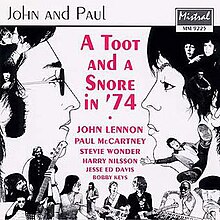
Malcolm Frederick Evans was an English road manager and personal assistant employed by the Beatles from 1963 until their break-up in 1970.
The Beatles' bootleg recordings are recordings of performances by the Beatles that have attained some level of public circulation without being available as a legal release. The term most often refers to audio recordings, but also includes video performances. Starting with vinyl releases in the 1970s, through CD issues in the late 1980s, and continuing with digital downloads starting in the mid 1990s, the Beatles have been, and continue to be, among the most bootlegged artists.

May Fung Yee Pang is an American former music executive. She worked for John Lennon and Yoko Ono as a personal assistant and production coordinator. When Lennon and Ono separated in 1973, Pang and Lennon began a relationship that lasted more than 18 months. Lennon later referred to this time as his "Lost Weekend". Pang published two books about her relationship with Lennon; a memoir, Loving John, and a book of photographs, Instamatic Karma. A documentary about their relationship, The Lost Weekend: A Love Story, was produced in 2022.
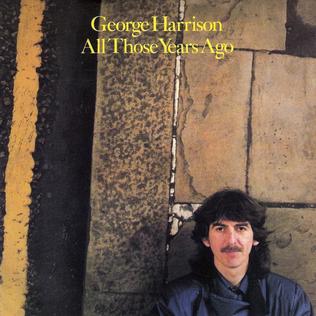
"All Those Years Ago" is a song by the English rock musician George Harrison, released in May 1981 as a single from his ninth studio album Somewhere in England. Having previously recorded the music for the song, Harrison tailored the lyrics to serve as a personal tribute to his former Beatles bandmate John Lennon, following the latter's murder in 1980. Ringo Starr is featured on drums, and Paul McCartney overdubbed backing vocals onto the basic track. The single spent three weeks at number 2 on the US Billboard Hot 100, behind "Bette Davis Eyes" by Kim Carnes, and it peaked at number 13 on the UK Singles Chart. It also topped Canada's RPM singles chart and spent one week at number 1 on Billboard's Adult Contemporary listings.
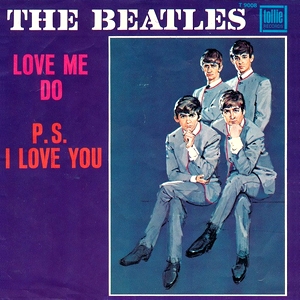
"Love Me Do" is the debut single by the English rock band the Beatles, backed by "P.S. I Love You". When the single was originally released in the United Kingdom on 5 October 1962, it peaked at number 17. It was released in the United States in 1964 and topped the nation's song chart. Re-released in 1982 as part of EMI's Beatles 20th anniversary, it re-entered the UK charts and peaked at number 4. "Love Me Do" also topped the charts in Australia and New Zealand.
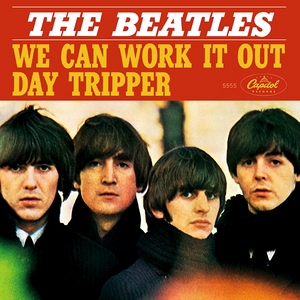
"We Can Work It Out" is a song by the English rock band the Beatles, written by Paul McCartney and John Lennon. It was first issued as a double A-side single with "Day Tripper" in December 1965. The song was recorded during the sessions for the band's Rubber Soul album. The single reached number one in Britain, the United States, Australia, Canada and Ireland. In the UK, it was the seventh highest selling single of the 1960s.

"You Won't See Me" is a song by the English rock band the Beatles from their 1965 album Rubber Soul. It was written by Paul McCartney and credited to Lennon–McCartney. As with songs such as "We Can Work It Out" and "I'm Looking Through You" from the same period, the lyrics address McCartney's troubled relationship with Jane Asher and her desire to pursue her career as a stage and film actress. The Beatles recorded the song during what author Mark Lewisohn describes as a "marathon" final recording session for Rubber Soul, to ensure the album's pre-Christmas release.

"Come Together" is a song by the English rock band the Beatles, written by John Lennon and credited to Lennon–McCartney. The song is the opening track on their 1969 album Abbey Road and was also released as a single coupled with "Something". The song reached the top of the charts in the United States and Australia, but peaked at No. 4 in the United Kingdom.
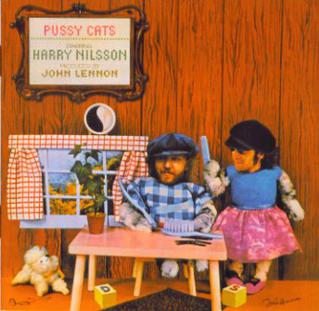
Pussy Cats is the tenth album by American singer Harry Nilsson, released by RCA Records in 1974. It was produced by John Lennon during his "Lost Weekend" period. The album title was inspired by the bad press Nilsson and Lennon were getting at the time for being drunk and rowdy in Los Angeles. They also included an inside joke on the cover – children's letter blocks "D" and "S" on either side of a rug under a table − to spell out "drugs under the table" as a rebus.
"Watching Rainbows" is an unreleased song by the Beatles recorded on 14 January 1969 during the Get Back sessions at Twickenham Studios. It features John Lennon on lead vocal and electric piano, Paul McCartney on electric guitar, and Ringo Starr on drums. No bass guitar was present as McCartney was filling in for the absent George Harrison, who had temporarily left the group at that stage of the sessions. The song is played in two chords and has since been compared to "I Am the Walrus" and "I've Got a Feeling" for the similarities in the song's lyrics and structure.

"Birthday" is a song by the English rock band the Beatles from their 1968 double album The Beatles. Written by John Lennon and Paul McCartney, mainly by McCartney, it is the opening track on the third side of the LP. Surviving Beatles Paul McCartney and Ringo Starr performed it for Starr's 70th birthday at Radio City Music Hall on 7 July 2010.

"You Never Give Me Your Money" is a song by the English rock band the Beatles. It was written by Paul McCartney, and thematically documents the personal difficulties that were facing the band. The song is the first part of the medley on side two of their 1969 album Abbey Road and was recorded in stages between May and August that year.

"I'm So Tired" is a song by the English rock band the Beatles from their 1968 double album The Beatles. It was written and sung by John Lennon, though credited to Lennon–McCartney. Lennon wrote the song during the Beatles' stay in India about insomnia he was having due to constant meditation and because he missed Yoko Ono. The song was recorded in the same session as another White Album song, "The Continuing Story of Bungalow Bill".

"Cry Baby Cry" is a song by the English rock band the Beatles from their 1968 double album The Beatles. It was written by John Lennon and credited to the Lennon–McCartney partnership. The coda of the song is a short segment referred to as "Can You Take Me Back", written by Paul McCartney, which was actually an outtake from the "I Will" session.

"Tell Me What You See" is a song by the English rock band the Beatles that first appeared in 1965 on their album Help! in the United Kingdom and on Beatles VI in the United States. The song is credited to Lennon–McCartney but mainly written by Paul McCartney. Regarding the song's authorship, McCartney said, "I seem to remember it as mine. I would claim it as a 60–40 but it might have been totally me." John Lennon said, in his interviews with Playboy (1980) and Hit Parader (1972), that "Tell Me What You See" was written completely by McCartney.

"Dig It" is a song by the English rock band the Beatles from their 1970 album Let It Be. The song is credited to Lennon/McCartney/Harrison/Starkey, and is one of the few songs to be credited to all of the Beatles. This song and the 39-second "Maggie Mae" appear on the Let It Be album, but are excluded from the Let It Be... Naked album, instead being replaced with "Don't Let Me Down". Glyn Johns' May 1969 version of the album, then titled Get Back, had a four-minute excerpt of "Dig It", which was later reduced to the much shorter version in the final album.
After the break-up of the Beatles in April 1970, John Lennon, Paul McCartney, George Harrison and Ringo Starr enjoyed success as solo artists and collaborated with each other on numerous occasions, including on both studio and live recordings. However, none of these collaborations included all four members, with the exception of "Free as a Bird" (1994), "Real Love" (1995) and "Now and Then" (2023).

S.I.R. John Winston Ono Lennon is a bootleg album of rehearsals before a concert of British musician John Lennon and his wife Yoko Ono, recorded in studio in late August 1972.
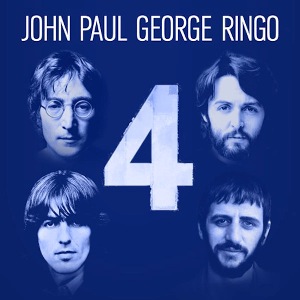
4: John Paul George Ringo is a digital extended play compilation released on 23 September 2014, as a free download by the iTunes Store. It features one solo song by each former member of the Beatles: John Lennon, Paul McCartney, George Harrison and Ringo Starr. It is the first official release to bring together their solo material.
